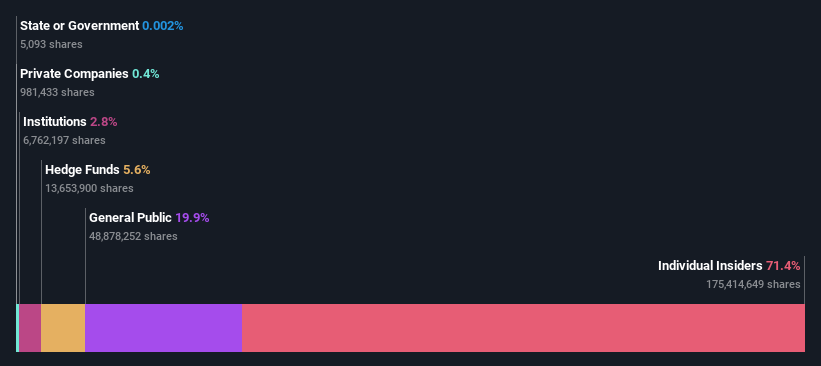- India
- /
- Real Estate
- /
- NSEI:TREL
Transindia Real Estate Limited (NSE:TREL) adds ₹1.1b in market cap and insiders have a 71% stake in that gain

Key Insights
- Transindia Real Estate's significant insider ownership suggests inherent interests in company's expansion
- 65% of the company is held by a single shareholder (Shashi Kiran Shetty)
- Past performance of a company along with ownership data serve to give a strong idea about prospects for a business
If you want to know who really controls Transindia Real Estate Limited (NSE:TREL), then you'll have to look at the makeup of its share registry. And the group that holds the biggest piece of the pie are individual insiders with 71% ownership. That is, the group stands to benefit the most if the stock rises (or lose the most if there is a downturn).
As a result, insiders scored the highest last week as the company hit ₹12b market cap following a 11% gain in the stock.
In the chart below, we zoom in on the different ownership groups of Transindia Real Estate.
View our latest analysis for Transindia Real Estate

What Does The Institutional Ownership Tell Us About Transindia Real Estate?
Institutional investors commonly compare their own returns to the returns of a commonly followed index. So they generally do consider buying larger companies that are included in the relevant benchmark index.
Less than 5% of Transindia Real Estate is held by institutional investors. This suggests that some funds have the company in their sights, but many have not yet bought shares in it. So if the company itself can improve over time, we may well see more institutional buyers in the future. It is not uncommon to see a big share price rise if multiple institutional investors are trying to buy into a stock at the same time. So check out the historic earnings trajectory, below, but keep in mind it's the future that counts most.

It would appear that 5.6% of Transindia Real Estate shares are controlled by hedge funds. That worth noting, since hedge funds are often quite active investors, who may try to influence management. Many want to see value creation (and a higher share price) in the short term or medium term. Shashi Kiran Shetty is currently the company's largest shareholder with 65% of shares outstanding. This implies that they have majority interest control of the future of the company. Conifer Management, LLC is the second largest shareholder owning 5.6% of common stock, and Arathi Shetty holds about 3.0% of the company stock.
While it makes sense to study institutional ownership data for a company, it also makes sense to study analyst sentiments to know which way the wind is blowing. As far as we can tell there isn't analyst coverage of the company, so it is probably flying under the radar.
Insider Ownership Of Transindia Real Estate
The definition of an insider can differ slightly between different countries, but members of the board of directors always count. Company management run the business, but the CEO will answer to the board, even if he or she is a member of it.
Most consider insider ownership a positive because it can indicate the board is well aligned with other shareholders. However, on some occasions too much power is concentrated within this group.
It seems that insiders own more than half the Transindia Real Estate Limited stock. This gives them a lot of power. Given it has a market cap of ₹12b, that means they have ₹8.3b worth of shares. Most would argue this is a positive, showing strong alignment with shareholders. You can click here to see if those insiders have been buying or selling.
General Public Ownership
The general public-- including retail investors -- own 20% stake in the company, and hence can't easily be ignored. This size of ownership, while considerable, may not be enough to change company policy if the decision is not in sync with other large shareholders.
Next Steps:
While it is well worth considering the different groups that own a company, there are other factors that are even more important. For example, we've discovered 3 warning signs for Transindia Real Estate that you should be aware of before investing here.
Of course this may not be the best stock to buy. Therefore, you may wish to see our free collection of interesting prospects boasting favorable financials.
NB: Figures in this article are calculated using data from the last twelve months, which refer to the 12-month period ending on the last date of the month the financial statement is dated. This may not be consistent with full year annual report figures.
Valuation is complex, but we're here to simplify it.
Discover if Transindia Real Estate might be undervalued or overvalued with our detailed analysis, featuring fair value estimates, potential risks, dividends, insider trades, and its financial condition.
Access Free AnalysisHave feedback on this article? Concerned about the content? Get in touch with us directly. Alternatively, email editorial-team (at) simplywallst.com.
This article by Simply Wall St is general in nature. We provide commentary based on historical data and analyst forecasts only using an unbiased methodology and our articles are not intended to be financial advice. It does not constitute a recommendation to buy or sell any stock, and does not take account of your objectives, or your financial situation. We aim to bring you long-term focused analysis driven by fundamental data. Note that our analysis may not factor in the latest price-sensitive company announcements or qualitative material. Simply Wall St has no position in any stocks mentioned.
About NSEI:TREL
Transindia Real Estate
A real estate company, engages in the development and leasing of land and commercial properties, logistics park, and warehouse.
Excellent balance sheet slight.
Market Insights
Community Narratives



